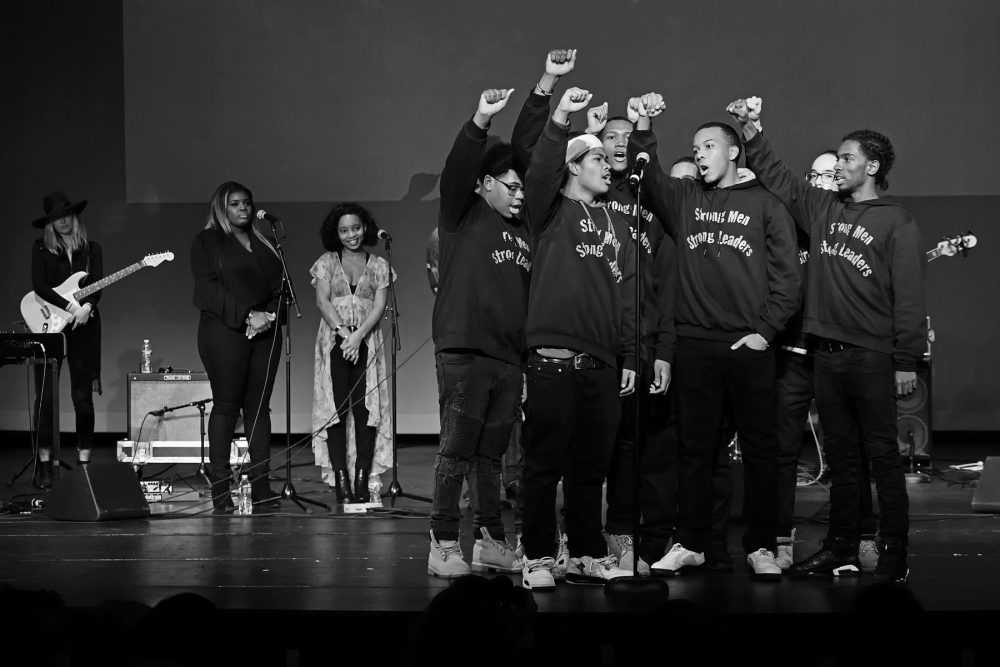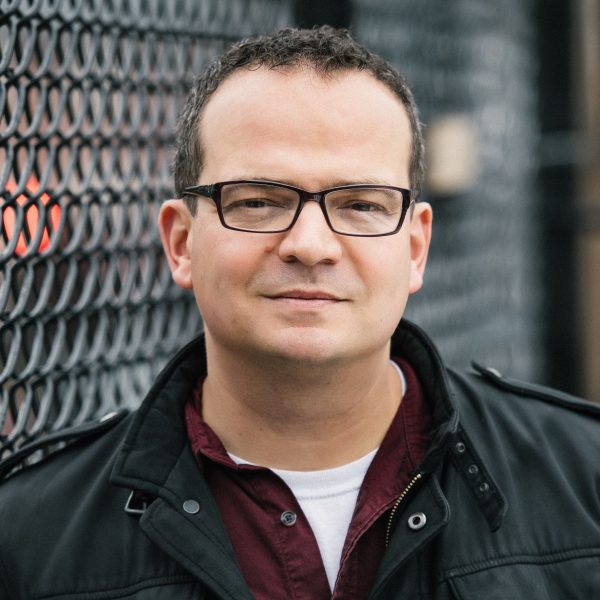Advertisement
They Have Suffered In This New World, But Still These Students Rise

COMMENTARY
The night before the inauguration, the Strand Theater in Dorchester was packed for an event called "Together We Rise: A Counter-Inaugural Celebration of Resistance." On the stage, musicians played songs of freedom, comedians cracked jokes about our incoming president and activists delivered testimonials on how his proposed policies would impact their lives.
The crowd was already buzzing when a group of high school students took the stage and introduced themselves as "Strong Men Strong Leaders," an organization for young men of color. These students performed step dance and spoken word, and not one line of their poems mentioned the new president. They spoke instead of their dreams and their fathers, of their mistreatment by police, of their promise always to have each others’ backs. As the echoes of their words and rhythmic stomps faded, the audience stood and shouted applause.
These students came from the Henderson K-12 Inclusion School, the public school in Dorchester where I work as director of instruction, and their presence on that stage can be traced directly back to a morning in November, a morning many of us now remember as the morning after.
That morning, I had to drag myself to work and I didn’t even think about turning on the radio. I was nauseous with exhaustion and grief after staying up all night, first watching election returns and then, later, not watching election returns. After I got to school, I tightened my tie, flicked on my walkie-talkie and set up the metal detectors. Then the students arrived. They lacked their usual swagger as they passed into the building; their faces were solemn, withdrawn. Some kid at the back of the line called out, “Trump,” and somebody shouted, “We’re all going to die,” but nobody laughed.
Some kid at the back of the line called out, “Trump,” and somebody shouted, “We’re all going to die,” but nobody laughed.
This was not going to be just another school day. After the bell sounded for first period, students began pushing out of classroom doors, some of them in tears.
“What’s the matter?” a teacher asked one young woman.
“I hate my skin.”
The morning after, I understood how our kids — almost entirely low-income students of color — were responding to the election. They weren’t coping with an abstract sense of loss, the betrayal of an idea of a country. Their emotion was more immediate and raw: they felt unsafe.
So we cancelled class and called for an extra advisory period, threw together a packet of suggested readings and questions for teachers, and then I walked from room to room, listening.
I heard a young woman ask if her mom, who was undocumented, was going to be sent back to Haiti. I heard a young man say this just meant more police shootings, and another say this was nothing new, since nothing had ever really changed for black people in America. I reminded them how a hundred years ago, the only people with the right to vote were white males with property. I pulled out that Dr. King quote about the arc of the moral universe, how it is long but it bends toward justice. But I could see I was losing them: a hundred years, the arc of history. These are teenagers, and the end of second period feels like an eternity. So I tried for a shorter time frame.
Advertisement
“In four years, every single student in this classroom is going to be eligible to vote.”
A kid raised his hand. “Four years is a long time.” I heard others grunt in agreement.
“Yes,” I said. “It can be.”
The next morning, our students arrived with stories: a sophomore chased through his own neighborhood by three grown white men shouting racial slurs, a junior who wears hijab spat on by a stranger in the subway. In the months since, our kids have faced too many incidents of hate to count, and slowly they have adapted to this new reality. It seems they have had to learn at a young age how to laugh in response to tragedy. Because before long, they were back, grinning and messing around, swaggering through the metal detectors.
A kid raised his hand. “Four years is a long time.” I heard others grunt in agreement.
Last month, we arranged for our local state representative to talk to our students. The rep was a product of Boston Public Schools, an Irish kid from Dorchester, and he delivered well-rehearsed lines about how hard he had worked to get into his position, how the key to success was to seize every opportunity you were handed. When he paused for breath, our students brought tough questions, as I knew they would.
“What have you done for Black Lives Matter?” “How will you stop the shootings around here?” The rep did his best to answer, shaking his head and laughing uncomfortably. “You guys don’t mince words, do you?” The question that got the strongest reaction was when a young woman approached the mic and asked, “How come so many of us don’t get free T passes when we don’t have money to get to school?” Her classmates began cheering before she even finished asking the question.
After the morning after, our students have learned to flip their raw emotion into civic engagement, and in this new era that doesn’t mean abstract conversations about policy; it means young people asking blunt questions about their own day-to-day survival. It means youth taking the stage, like Strong Men Strong Leaders did the night before the inauguration, reciting poems to let us know that holding fast to their dreams and leaning on their brothers is the ultimate act of resistance.
What that student said is true: Four years is a long time. By the time our current freshmen have graduated and are eligible to vote, they might be drafted into a war ignited by 2 a.m. tweets, and our school could be even closed thanks to a secretary of education who would gut public education. But my hope is that, through these four long years, our kids will keep on asking those tough questions, keep on leaning on each other and keep on telling their stories. Just maybe they can kick the moral arc of the universe until it bends just a bit shorter, toward the country they deserve.
Now, on my morning drive, when the phrase “President Trump” comes on the radio, I still feel nauseous, but I no longer turn down the volume. It would be an act of privilege to ignore what is happening; my students don’t have the option to turn down the danger they face for simply walking down the sidewalk. If they can swagger through the metal detectors and find humor and maybe even hope in the face of tragedy, then the least I can do is face this thing head on. The next four years will be a life-and-death struggle, especially for the most vulnerable among us, and so I’m glad this is the direction my car is headed, glad to get back to work.
